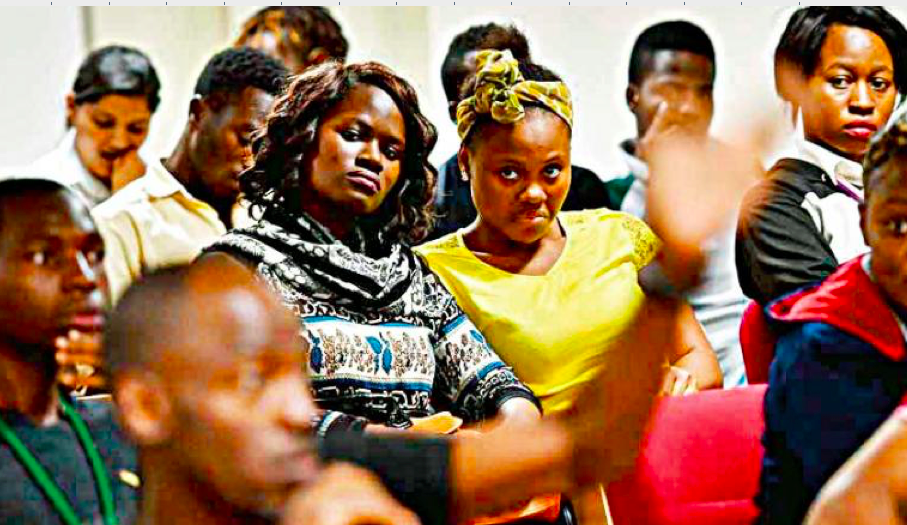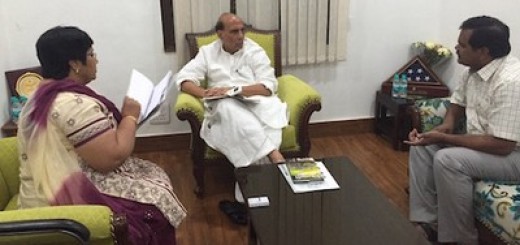Colour of Hate

Reflection on Racism & Cateism – Sunanda K. Datta-Ray in Deccan Chronicle (June 7/16)
The spate of attacks on Africans since January shames us as a nation.
It brings greater disgrace to a government that fails to take prompt action against such barbarism.
(Note: Racism is the aftermath of Casteism in India. No one can say, it is new in India if at the UN India was accused of it already in 1950. May be the word racism was not used, but casteism with it four-fold inferiority and superiority divisions is instilled and ingrained in the Indian psyche by its own religious traditions and scriptural teachings. It militates against human equality, which is clear as day light in modern times. As a result anyone who still sticks to a claim of superiority over others due to the sole fact of his/her birth is antideluvian in thinking and not worthy of living in modern times. That is why Abedkar opted to become a Bhudhist to at least to die as one equal to others than to stay in life as inferior to any other. As said rightly in this article, caste ridden and colour conscious racism is a slur on Indian civilization. In spite of all this rhetoric about the equality of all humans, factually, there are superior and inferior personalities among humans on the basis of natural or acquired talents one may possess and exhibit. That is where meritocracy comes into play and geniuses shine on the strength of their vision, conviction and action, not on the bases of their class, caste or race. Pot calling the kettle black is racism or casteism. That is what most Indian do when they consider themselves superior to other peoples or nationalities. Every time racism or casteism rears its usgly head both the government and watchful media should take all actions to wipe it out from society. Recently there was the abduction and torture of Bishop Gallela of Cudappah by upper caste Reddy priests on  which we published several reports condemning it. Unfortunately no such reactions have come from CBCI Chairman Cardinal Cleemis of Trivandrum or from other Indian bishops who preach human brotherhood from their comfortable pulpits. james kottoor, editor)
which we published several reports condemning it. Unfortunately no such reactions have come from CBCI Chairman Cardinal Cleemis of Trivandrum or from other Indian bishops who preach human brotherhood from their comfortable pulpits. james kottoor, editor)
 Sunanda K. Datta-Ray is a senior journalist, columnist and author In the late 1950s, Portugal accused India at the United Nations of racism. The charge was based on complaints by African students who had suffered discrimination, including being jeered at in the street as “Hubshee!” Unaware of the African blood that has flowed through Portuguese veins for five centuries, New Delhi retaliated by indignantly accusing Lisbon of trying to distract attention from its iniquitous stranglehold on Goa. Those were the years of non-alignment and Afro-Asian solidarity. Indians believed it was inconceivable that any God-fearing non-aligned Afro-Asian should practise discrimination like the criminally imperialist West.
Sunanda K. Datta-Ray is a senior journalist, columnist and author In the late 1950s, Portugal accused India at the United Nations of racism. The charge was based on complaints by African students who had suffered discrimination, including being jeered at in the street as “Hubshee!” Unaware of the African blood that has flowed through Portuguese veins for five centuries, New Delhi retaliated by indignantly accusing Lisbon of trying to distract attention from its iniquitous stranglehold on Goa. Those were the years of non-alignment and Afro-Asian solidarity. Indians believed it was inconceivable that any God-fearing non-aligned Afro-Asian should practise discrimination like the criminally imperialist West.
Those were also the years when V.K. Krishna Menon strode the UN stage like an evil genius breathing fire and brimstone at every European nation save the Soviet Union and its satellites. He had some harsh things to say about Dr Antonio de Oliveira Salazar’s dictatorship in Lisbon. Menon quit the stage in disgrace after his blunders led to India’s humiliation in the Himalayas. The Soviet Union collapsed under the weight of its military burdens.
India annexed Goa 55 years ago. The coup of April 25, 1974, toppled the Portuguese regime with which India was in conflict. But, tragically, the racism that Portugal brought up at the UN not only survives but has grown with malevolent vigour. Burgeoning economic confidence and the new spirit of political assertiveness that reigns in New Delhi seem to have encouraged Indians to discard the mask of civilisation and emerge in their true colours.
It is not a pretty sight. The spate of attacks on Africans since January when a mob dragged a group of Tanzanian students out of a car, the murder last month of the Congolese teacher, Masunda Kitada Oliver, following a fight over an autorickshaw in Delhi, and three separate incidents in the capital in the following week, with seven Africans assaulted, shames us as a nation. It brings even greater disgrace to the government that fails to take prompt action against such animal barbarism, and to ministers like Sushma Swaraj and her junior, V.K. Singh, whose comments do not indicate the responsibility that is expected of high office.
Some might say Portugal’s charge against India was like the pot calling the kettle black. Although one sees no sign of race tension in the Lisbon I have just left, the inhabitants of the ramshackle suburb called Cova da Moura on a hill in the city’s outskirts have some grim tales to tell about police brutality. Cova da Moura was built by immigrants from Portugal’s former African colonies. Its restaurants serve the cuisine of Cape Verde. Its streets resonate to music from Angola. It has a reputation for drugs, crime and violence. Taxi drivers don’t dare to venture into the area after dark.
Nevertheless, hundreds of thousands of people from Portugal’s former colonies — they were called “overseas provinces” — in Africa and Polynesia have found refuge in this country. There were reports last year of Goans paying up to 1,000 euros for forged Portuguese passports. Thousands of Bangladeshis live and work here to qualify for European Union residency. To cap it all, the conservative Pedro Passos Coelho, who was Prime Minister from 2011 to 2015, was married to a black woman, Laura Ferreira, a physiotherapy technician, born in Bissau in Portuguese Guinea (now Guinea-Bissau) in West Africa. Can one imagine a black political First Lady in India?
Watching a long procession of priests headed by a prelate wending its way up the hill in the small town of Evora on the festival of Corpus Christi I saw several black faces above snow-white surplices and many black hands holding prayer books. Race made no difference to these worshippers at the early 16th century Igreja de Sao Francisco, a towering Manueline-Gothic cathedral just above my hotel.
Among all the slaving nations of the West, Portugal was probably the only one to bring slaves back home. The first blacks came to Lisbon in 1441. They continued to be imported in such numbers that by 1550, the population of Portugal was 10 per cent Negro. (In comparison, the United States is 13-14 per cent black today). There being no social, religious or legal taboo or injunction against inter-racial sexual relations, miscegenation became common and Africans were soon assimilated into the general population. Portugal’s present-day population is one of the most homogeneous in Europe, with no national minorities. The only blacks one sees today are modern colonial immigrants.
Obviously, this ethnic integration was not to the liking of all Europeans. Some even attributed Portugal’s decline as a global power to its racial admixture. In the middle of the 16th century, Portugal’s position resembled that of the US today. It was the world’s wealthiest and most powerful country with territorial possessions in Asia, Africa and America. Like the English Elizabethans, the Portuguese were poets and explorers, a race of highly civilised, imaginative, intelligent and daring people who made important contributions to the Renaissance.
But, unlike England and other European countries, Portugal had a large number of blacks while its white population was declining. The 11th edition of Encyclopedia Britannica, published in 1911 and regarded as the most authoritative, noted: “The Portuguese intermarried freely with their slaves, and this infusion of alien blood profoundly modified the character and physique of the nation. It may be said without exaggeration that the Portuguese of the ‘age of discoveries’ and the Portuguese of the 17th and later centuries were two different races.” Despite that sour note, Portugal is a placid country. Despite some friction in the slums, it displays none of the naked racism that is a slur on India’s civilisation. Caste-ridden and colour-conscious Indians have much to learn from the maligned Portuguese.
















